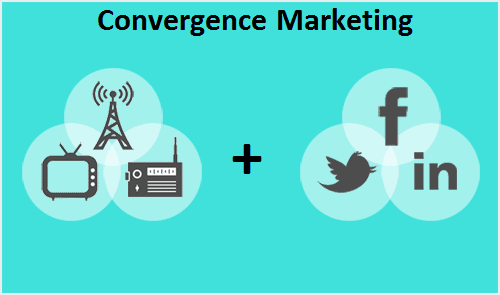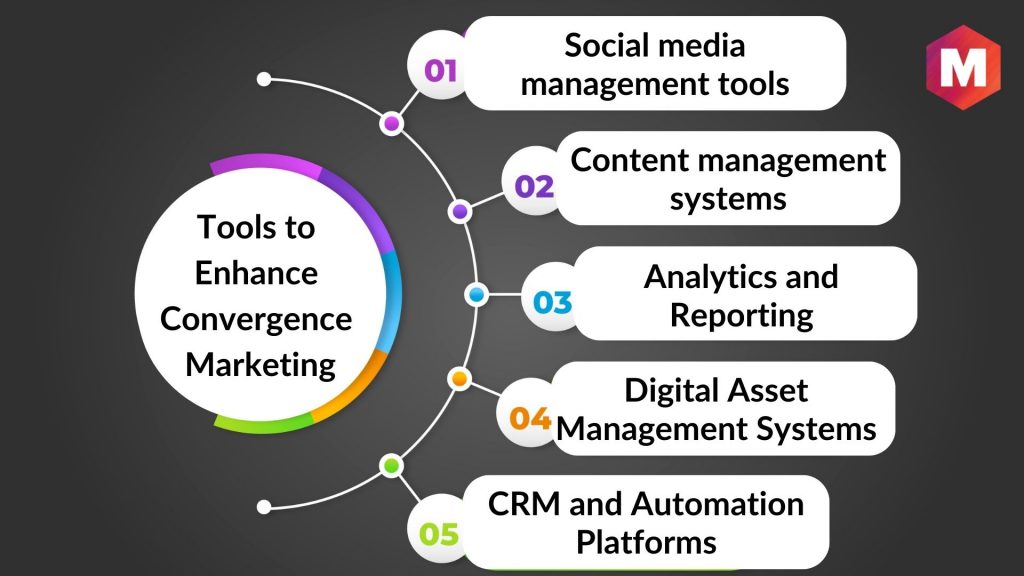Table of Contents
Definition
Convergence marketing refers to customer-centric marketing in which the marketing, design, sales, and IT teams coordinate to ensure the company presents a uniform, consistent, unambiguous, and engaging message through all media channels it utilizes.
What is Convergence Marketing?
Convergence Marketing is a strategy that examines the complete marketing environment and combines it into a unified plan by linking various marketing channels and assets. It enables marketers to create a holistic strategy for client connection by combining diverse techniques across different touchpoints.
An omnichannel approach is one form of convergence marketing wherein all channels work together to provide a unified customer experience. Businesses can contact clients more directly by mixing digital and traditional techniques such as television, radio, print media, and online advertising in a single campaign.
Overall, convergence marketing seeks to create a smooth and unified customer experience, which leads to increased brand fidelity and sales. It is a valuable tool for any business, whether new or old. Companies may use convergence marketing to create an experience that will stick with and engage their customers.
Key Takeaways
- Convergence marketing combines different marketing platforms into a single strategy that gives customers a better experience.
- It blends digital and traditional media to make all customer interactions more personal.
- This method makes it easier for customers to connect with a brand, which boosts brand loyalty and sales.
- To send uniform and interesting messages, the marketing, design, sales, and IT teams need to work together.
- Focuses on a customer-centered approach and the full coordination of different marketing strategies.
Meaning of Convergence in Marketing
Convergence in marketing combines traditional marketing efforts, such as direct mail and television advertising, with digital marketing communication channels like email, search engines, and social media.
By utilizing all of these channels together, businesses can develop a comprehensive marketing strategy that increases customer engagement and captures the attention of potential customers. Convergence marketing strategies also allow companies to get creative with their campaigns and track customer data gathered from different sources to create more targeted and effective campaigns.
Convergence marketing vs. integrated marketing
Though frequently misunderstood as identical, Convergence Marketing and Integrated Marketing share analogous principles but differ in their overall scope and application.
Integrated Marketing
Integrated marketing is about coordinating marketing statements across different communication channels to raise brand awareness. It is a more focused, separate plan that mainly focuses on the work of the marketing department. In integrated Marketing, a brand’s ads have the same theme across TV, social media, and email promotions.
Convergence Marketing
On the other hand, convergence marketing looks at a bigger picture, going beyond the traditional marketing department and including all of a brand’s parts that could interact with customers. It links customers’ offline and online experiences and includes more than just marketing messages. It includes products, customer service, and how employees deal with customers. Convergence marketing is like trying on clothes in a store, researching them online, finding a discount on the brand’s social media page, and using it at the online checkout. This flow from one experience to the next is what convergence marketing is all about.
Each strategy has its own strengths and weaknesses. However, because convergence marketing looks at the customer journey and communication channels more broadly, it often naturally incorporates aspects of integrated marketing. The opposite might not be completely true since Integrated Marketing rarely looks at things outside its marketing messages.
| Integrated Marketing | Convergence Marketing | |
|---|---|---|
| Focus | Primarily on the coordination of marketing messages across different channels. | Holistic view that goes beyond marketing messages and includes all aspects of the brand. |
| Department | Primarily considers the marketing department. | Surpasses the marketing department and incorporates all touchpoints for customer communication. |
| Customer Experience | Offers consistent brand messaging across different marketing channels. | Connects the customer's offline and online experiences, providing a seamless interaction with the brand. |
| Scope | Has a more isolated scope—limited within the purview of marketing messages and their uniformity. | Has a broader view acknowledging every minor and major element that contributes to brand identity and customer engagement. |
| Usage | Frequently used in conjunction with an existing marketing strategy. | Can fully encapsulate Integrated Marketing due to its expansive scope and focus on the overall customer journey. |
Examples of Convergence Marketing
From advertising campaigns that combine digital, print, television, and radio to websites and mobile apps that feature multiple content types such as video, audio, and text, convergence marketing is becoming more popular every day. Companies like PepsiCo have even created mobile app-based loyalty programs that reward customers for engaging with their brand in many ways. Some of the other examples that will help you understand convergence marketing better include –
1. Smartphones
In IT, convergence typically means combining various digital products and technologies into one device.
For instance, mobile phones are no longer limited to communication. They possess features of computers, gaming devices, and TVs. As a result, various forms of media have become more portable and interactive.
Convergence marketing has emerged as a result of this need. Nowadays, businesses must alter how they advertise their products. This is largely because television and other traditional and digital forms of media are only one of many sources of information available.
Before the internet and digital devices became affordable to the general public, companies primarily used television to reach their target audience. Jim Stengel, the CMO of P&G, stated that in 1965, three 60-second TV spots could get 80% of adults, but today it takes 117 prime-time commercials to achieve the same outcome.
Convergence marketing happens when marketers utilize information technology to create a unified, interactive, and consistent message across all their media channels.
The convergence marketing strategy focuses on the customer and utilizes technology to target them via various communication mediums, such as social media, video sites, news sites, forums, and blogs. This allows for the targeting of like-minded individuals.
2. Online Advertising
An example would be online advertising, where websites are organized by specialty. Dell can advertise on technology-based and entertainment websites with a large audience if it wants to advertise.
Dell can use various methods, such as creating a jingle on iTunes, developing an app, or conducting email marketing to simultaneously reach its customers through multiple channels.
Marketing specialists are no longer using the term “traditional customer” and are instead referring to a new type of audience known as the “hybrid consumer” or “cyber consumer.” This audience is growing, and more channels are now available.
The buying behavior of the modern consumer has changed, prompting businesses to adopt convergence marketing to remain successful.
Businesses can now establish more individualized connections with customers by utilizing smartphones instead of broad marketing strategies. While this is beneficial, businesses have needed help with messaging content. The effective communication principle emphasizes that messages should be accessible, easily viewable, and user-friendly.
3. Mixing Online and Offline Marketing
To better grasp the concept of convergence as successful marketing strategy, let’s explore a real-life scenario where it is being utilized. With the advent of the internet, virtual communities have emerged, bringing together individuals from different parts of the world who share common interests. Companies can leverage this phenomenon to their advantage.
Yet, each member also belongs to a real-life community. So, businesses must integrate virtual and physical communities while aligning their goals with economic benefits. Essentially, they aim to achieve a tangible ROI from these communities.
These companies aim to enhance the connection between their online and offline communities to achieve their business goals. One way they do this is by organizing events in a particular location based on the purpose of the community they have created and then sharing invitations through their online platform.
Merging virtual and physical communities enables various activities like sharing emails and creating viral videos.
Hence, combining both online marketing and offline channels is one of the most effective ways convergence marketing is practiced. Nowadays, customers prefer to be reachable through various means of communication, such as visiting in person, calling, or visiting a website. Therefore, they anticipate an unbroken conversation over all these channels.
Companies need to create strategies that integrate online and offline methods and give customers the freedom to choose their preferred mode of interaction.
Overall, companies now recognize the importance of catering to tech-savvy consumers. Therefore, they need to keep up with the latest technology and utilize convergence marketing to maintain their profitability while maintaining high-quality standards.
Departments Where You Can Apply Convergence Marketing To
A business can apply convergence marketing to various departments, such as sales and marketing, customer service, product development, research and development, etc. Here are some examples of how convergence marketing can help improve a company’s performance:
1. Sales and Marketing Departments
This is where convergence marketing comes into play the most. It allows companies to create meaningful and impactful campaigns that target customers from different channels. Companies can integrate cross-channel marketing strategies to create consistent customer experiences that increase sales.
2. Customer Services
By applying convergence marketing to the customer service department, businesses can provide a streamlined customer experience by providing assistance and information across all channels. This helps build stronger relationships with customers as they can efficiently get their needed help.
3. Management
Convergence marketing also helps managers create better strategies and decisions for their company by providing them with the big data that they need to make informed decisions. This includes understanding customer behavior, sales trends, and market changes.
4. Communications
Through convergence marketing, businesses can ensure that their customers are constantly informed about new products and services through direct mail marketing, email campaigns, online communication, and other channels. This helps create a better customer experience as they will always be up-to-date with what’s happening.
5. Product Development
Companies can use the insights from convergence marketing to create better products and services tailored to their customers’ needs. This allows businesses to stay ahead of the competition while creating a better customer experience.
Convergence Marketing Advantages
Convergence marketing is increasingly becoming more important in the current digital landscape. By leveraging the potential of modern technologies, businesses can create a unified message across all their channels and platforms—giving them an advantage over competitors who focus on disparate campaigns from multiple sources. It also allows them to understand their customer’s behaviors and preferences better, allowing them to deliver more tailored and targeted marketing messages. Some of the notable advantages are –
1. Optimized customer experience
Convergence marketing enables businesses to create a personalized, unified customer experience that will increase brand loyalty and sales.
Convergence marketing means merging marketing channels and strategies to form a unified customer experience. This approach called convergence marketing helps businesses optimize their customers’ journeys and ensure they are provided with an exceptional experience that will lead to more sales.
2. Improved brand recognition
Businesses can improve brand recognition and create a more memorable impression on customers by creating a unified, consistent message across all channels. This consistency also creates trust in the brand; when customers see a recognizable logo or message, they are more likely to trust the company and be willing to purchase from them.
3. Breaking down silos
Convergence marketing helps break down organizational silos and encourages collaboration between different departments. By uniting different teams, businesses can leverage the strengths of each department to create a more unified message that will help them reach their goals.
4. Customer-centric approach
Convergence marketing allows businesses to adopt a customer-centric approach, essential for success in today’s competitive landscape. By better understanding their customers and delivering tailored messages, businesses can provide an experience that meets their customer’s needs and stands out from the competition.
5. Increased ROI
By combining different tactics and strategies, businesses can create more effective orchestration of offline and online marketing campaigns that result in higher ROI. This holistic approach also ensures that the resources used are optimized; instead of investing in several strategies, businesses can focus on creating an integrated message that will maximize their return.
Tools to Enhance Convergence Marketing
Some of the tools that you can use for optimizing your convergence marketing campaigns are-
1. Social media management tools
Social media management tools are used for creating, managing, and optimizing content shared on various social media platforms. These can help you reach a wider audience and create meaningful conversations that tap into the power of word-of-mouth marketing. Some of such tools can be Hootsuite, Sprout Social, and Sendible.
2. Content management systems
Content management systems (CMS) provide a platform for organizing digital content. They can be used to create websites, blog posts, and other engaging content optimized for search engine performance. Examples of popular CMS are WordPress, Drupal, Joomla, and HubSpot.
3. Analytics and Reporting
Analytics tools provide insights into user behavior. They can track key metrics such as page views, time spent on a page, bounce rates, etc. These help you measure a campaign’s success and identify improvement areas. Tools like Google Analytics and Adobe Analytics are widely used for this purpose.
4. Digital Asset Management Systems
Digital asset management systems provide a platform for managing and organizing all the digital content associated with a brand, such as images, videos, logos, etc. This helps to ensure that your content is accessible when needed and also makes it easier to deliver personalized experiences. Examples of these tools are Bynder and Brandfolder.
5. CRM and Automation Platforms
CRM and automation platforms are used to automate marketing activities. They can help segment customers, personalize content, automate emails, run campaigns, and more. Examples include Salesforce Marketing Cloud and MailChimp.
Unlock the Power of Convergence Marketing
Convergence marketing combines the power of all these tools and strategies to create engaging experiences that will drive results. It involves making an integrated marketing approach, leveraging all available channels and tools for maximum impact.
This can be a powerful tool for any brand looking to boost their visibility and customer engagement. With convergence marketing, you can harness the power of automation, analytics, CRMs, and other digital marketing tools to maximize your success. So don’t wait any longer – unlock the power of convergence marketing now!
Liked this post? Check out the complete series on Marketing



This is great information Hitesh. I do agree that convergence marketing can be powerful when utilized the right way for any business online or off, The key is adopting the different marketing methods and techniques to the business with the least disruption to the everyday flow of the business, The truth of the matter is if your business has not integrated convergence marketing into your overall marketing plan you really are leaving the door open for the competition to take advantage while leaving a lot of business on the table.
Hitesh, This was a very informative and All round useful article. I agree that Convergence is a great way to market in Digital Technology.. What ways do you think this may grow or Dial down in amongst a pandemic? Do you believe this industry is going to see a loss like others have? And apart from Smartphones which technology do you think benefits most from Convergence Marketing?
Regards Marketing Student
Bronte Ellard.